
Lock and Load
George Guidoni
Design & Innovation Bottles Coding & Labeling Glass Aesus Packaging Systems Big Spruce Brewery Boxing Rock Brewery Breton Brewery Cask Global Canning Solutions DME Process Systems Ltd. Garrison Brewing Co. he Propeller Brewing Co. Nine Locks Brewing Co. Prime Creative Spectrol Inc. Tatamagouche BreweryNova Scotia craft brewer leverages advanced shrinksleeve labeling technology to establish ban fide industry leadership credentials
There are many ways to unlocking your true potential in the burgeoning Canadian craft beer industry, but some companies just seem to have a natural knack for doing it faster and with bigger aplomb than others.
Although it only came online only a brief three-and-a-half years ago, Dartmouth, N.S.-based microbrewer Nine Locks Brewing Co. has wasted little time in establishing itself as one Nova Scotia’s top craft beer producers—no small feat in a province boasting the distinction of having the most breweries per capita in Canada.
“We haven’t stopped expanding since we opened,” says company founder and president Shaun O’Hearn, a restaurateur operating a popular Halifax pub and eatery called Your Father’s Moustache.
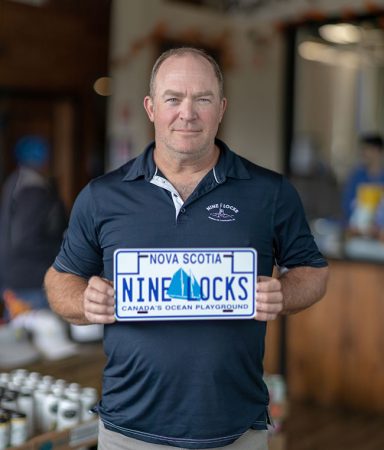
Nine Locks Brewing founder and president Shaun O’Hearn proudly displays a piece of branded merchandise sold at the Dartmouth brewery’s frontstore, which also carries a varied selection of the company’s popular canned premixed cocktails and vodka soda products.
With the restaurant’s on-site brewpub cultivating a loyal local fan base among the region’s craft beer aficionados, O’Hearn saw good opportunities in the province’s then-fledgling marker for craft beer for his own product that, in compliance with local regulations,
could only be sold on-site.
So after one particularly inspired beer-tasting evening around a family backyard firepit with his cousin Danny O’Hearn in the summer of 2014, Shaun did what many of his brewpub patrons have been urging him to do for years and proceeded to look for a good
nearby location for his own brewery.
Soon enough, the O’Hearns found themselves building that brewery in the municipality of Dartmouth, a renowned “City of Lakes” that was amalgamated into the metropolitan Halifax urban core back in 1996.
The founders drew inspiration for the brewer’s name from the nine locks built along the nearby historic Shubenacadie Canal—completed in 1861 to transport goods across the province for 10 years before the railroad was built—which is nowadays primarily used for pleasure boating, sailing, canoeing and kayaking.
Available only in 473-ml aluminum cans, the company’s flagship Nine Locks product range today includes the Nine Locks Cream Ale, Nine Locks IPA, Nine Locks Fathom Double IPA, Nine Locks Pale Ale, Nine Locks Porter, Nine locks ESB (Extra Special Bitter), Nine locks Watermelon Blonde; and the award-winning Nine Locks Dirty Blonde wheat beer.
The brewer also has a selection of seasonal Nine Locks products released at different times of the year, including Harvest Pumpkin Ale, Vanilla Porter, Apricot Blonde, Double Chocolate Stout, Scotch Ale and Bohemian Raspberry Sour, to name just a few.
Alas, Canadian craft beer enthusiasts can only find these beers in the Maritimes provinces, Shaun O’Hearn relates, at least for the time being.
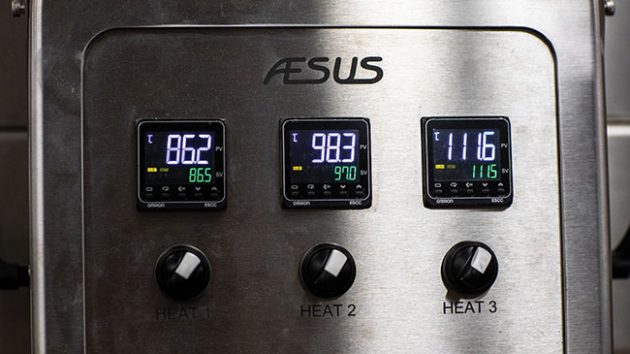
Manufactured by Montreal-based Aesus Packaging Systems and utilizing Omron controls, the Compact Premier model shrinksleeve labeler takes care of all of the brewery’s current labeling needs, while boasting a lot of extra throughput capacity to accommodate the company’s requirements for higher-speed throughput in the near future.
“Our beer is currently sold across the province in the Nova Scotia Liquor Commission stores, as well as at four privately owned wine and beer speciality stores in Metro Halifax, and at our own retail store at the brewery in Dartmouth. We can also be found at numerous bars and restaurants across the province,” says O’Hearn, citing the operation’s limited annual capacity of about 15,000 hectoliters.
“We are already at maximum capacity in our current facility and can’t expand our current distribution if we wanted to,” O’Hearn explains.
“However, we are currently planning a new brewery for the spring of 2021 that will significantly increase our capacity,” says O’Hearn, noting the extra output will enable the Nine Locks to expand its geographic market reach.
That will be good news for craft beer fans in other parts of the country who like their beers natural and wholesome.
“All of our beer is made from all-natural ingredients,” O’Hearn proclaims, “and we don’t filter or pasteurize our beer.
“We brew all our beer in a full mash brewery—meaning that we start with the basic ingredients of malts, hops, and yeast to make our beer,” O’Hearn relates.
“The process starts with milling the grain, whereby we use premium two row malt and blend it with specialty malts,” O’Hearn continues. “Those malts are cracked in our mill in order to extract the fermentable sugars.
“The cracked malts, now called ‘grist,’ is then transferred to a mash tun, where it is mixed with hot water in a process called mash conversion, which uses the natural enzymes in the malt to break the malt’s starch into sugars.
“The mash is then transferred to a lauter tun, where the liquid, now called ‘wort,’ is separated from the grain husks.
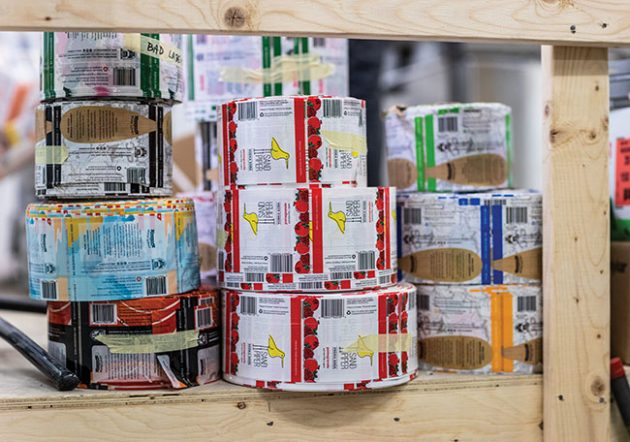
A sampling of high-quality UV flex-printed shrinksleeve label rolls supplied to the Nine Lock Brewing operation in Dartmouth by Spectral Inc. of Mississauga, Ont..
“The wort is then transferred to the kettle, where it is brought to a boil and the hops are added in,” O’Hearn relates. “After boiling, the wort is transferred to a whirlpool, where the liquid is separated from any malt or hop particles.
“The liquid is then transferred to a fermentation tank, where we will pitch yeast that will convert the sugary wort into beer by producing alcohol.”
O’Hearn says the company also “dry hops” some of its beer in the fermenting tanks by adding different hops in the latter stages to give the finished beer different aromas.
Once the fermentation is complete and the beer is given some time to mature in fermentation tanks, the product is transferred to the bright tanks to be carbonated, after which it is either kegged or canned.
“We decided to package all our beer in cans for a few reasons. We feel that cans better protects the product from light and air than glass bottles, (beer’s worst enemies),” O’Hearn says. Cans are also easier to carry, you can throw a few in your backpack for a hike, or in a cooler to bring to your campsite without concern of broken glass ruining your trip.
“Being lighter than glass, cans also cost less to transport,” he adds. “Moreover, it takes less energy to recycle aluminum compared to glass, which makes it better for the environment.”
Adds O’Hearn: “In the past number of years there has been a transition from craft beer mainly being sold in bottles to now mainly being sold in cans.
“I think that in the past there was a stigma about canned beer being of lower quality, but now people are accepting cans as a better vessel for their beer.”
Housing a 7,000-square-foot brewhouse and a 7,000-square-foot storage and sleeving area, the Nine Lock brewery employs a DME kegging line—manufactured by DME Process Systems Ltd. in Charlottetown, P.E.I.—to fill about 40 kegs per hour.
For the canned product, Nine Locks uses a Cask ACS canning line—manufactured by Cask Global Canning Solutions of Calgary, Alta.—that runs at approximately 25 cans per minute.
“Both the kegging machine and the canning line run roughly 10 hours a day, five to six days a week, in the busy summer season,” O’Hearn relates.
“Summer is always the busier season for beer companies as there are more barbeques, trips to the cottage, and open patios that time of the year,” O’Hearn notes.
“It is no different for our brewery: production usually ramps up in April and we run flat-out till the end of August.
“Even then, we are getting ready for our autumn seasonal beers being released in September and October,” says O’Hearn, adding Nine Locks is always looking for ways to optimize its output to match any fluctuations in market demand.
“We are currently in the market for a new canning line that would run between 120 and 160 cans per minute,” say O’Hearn, noting similarities between his company’s growth and that of the craft brewing industry in general.
“The craft beer industry has exploded in the past 10 years in Nova Scotia and across the country,” he states.
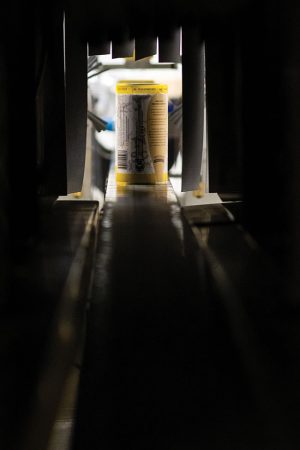
A can of beer exiting the patented hybrid Aesus shrink tunnel that employs both infrared and steam heating methods to ensure perfect wrinkle-free application of every label to the cans’ surfaces.
“In the past 10 years the number of breweries in Nova Scotia has grown from around 10 to over 50 companies,” says O’Hearn, citing the province’s other leading craft brewers such as The Propeller Brewing Co., Garrison Brewing Co., Breton Brewery, Big Spruce Brewery, Boxing Rock Brewery and Tatamagouche Brewery.
“There are world-class quality beers being produced in Nova Scotia,” says O’Hearn, citing the bronze medals picked up by the Nine Locks Dirty Blonde brand in the recent 2019 Canadian Brewing Awards competition.
“Dirty Blonde, along with our 2018 Barley Wine, aged for 12 months in single malt whiskey barrels from Nova Scotia’s own Glen Breton Distillery, received the only awards in 2019 that went to Nova Scotia,” he points out.
Says O’Hearn: “Says O’Hearn: I feel like we have done very well in such a short time in Nova Scotia because we have a range of solid beers that are as true to their styles as possible. We don’t try to over hop our IPA’s or create a beer that is overly malty. Not that there is anything wrong with super hoppy or malty beer, many people love them, it’s just that ours might appeal to more people.
“Our flagship beer Dirty Blonde is a very approachable wheat beer that is full of flavor but also easy to drink and appeals to a very wide range of beer drinkers,” O’Hearn cofides. “We have definitely converted a lot of mainstream beer drinkers to craft beer drinkers with Dirty Blonde.
“Our head brewer Jake Saunders is extremely passionate about his craft and has extensive knowledge of beer in general,” O’Hearn relates.
“On top of making fantastic beer, our team has done a great job designing attractive cans that showcase Dartmouth and Nova Scotia,” says O’Hearn, extending credit to Halifax-based graphic designers Prime Creative for spearheading the development of attractive, streamlined beer labels boasting color-coded logos depicting a stylized picture of a rowing kayaker—set against a sliver backdrop showing close-ups of the map of Nova Scotia.
“Packaging plays almost as important a role as the product that we put in the cans,” says O’Hearn,” adding the brewer’s canned products are currently sold in individual cans and four-packs.
“The quality of the package is a reflection of the product that is going in it.
“The basic message of this design is that that we are a local Nova Scotia company that loves where we are from and are proud to call Nova Scotia home,” O’Hearn proclaims.
To get that message across loud and clear on every can of beer produced at Nine Locks, the brewer employs a Compact Premier shrink labeling system manufactured by Montreal-based Aesus Packaging Systems—purchased about a year ago—and high-quality shrinksleeve labels printed by labeling converter Spectrol Inc. of Mississauga, Ont.
According to O’Hearn, having in-house shrink-sleeving capabilities provides the brewer with operational flexibility to package its product in true on-demand JIT (just-in-time)fashion, without having to maintain a large inventory of pre-printed or pre-sleeved cans.
“The Aesus sleeve applicator allows us to purchase blank cans in bulk and then sleeve them as needed,” O’Hearn states.
“This saves us money by not having to store a number of pre-sleeved cans off-site, and by being able to order sleeves in the quantities that we require. With printed or pre sleeved cans, there are often minimum orders required, which could result in unused cans.”
Adds Aesus vice-president of sales Stephen Mons: “Nine Locks was looking for a small-footprint machine that could automatically apply shrink labels onto the ‘silver bullet’ cans at speeds up to 150 cans per minute, as well a shrink tunnel that could shrink the film in a fashion that the consumer would think that the decoration is printed onto the can.
“It turned out that Aesus had the very machinery they needed,” Mons recalls. “The model Compact Premier shrinkleever has one of the smallest footprints in shrink labeling, and it uses servomotors to draw down the film and high-speed rotary blades to cut the film with unerring precision.”
As for the shrinking part of the process, the patented hybrid shrink tunnel supplied by Aesus uses a combination of dry infrared curing and steam to provide a cost-effective and energy-efficient solution for the brewer’s labeling needs.
“The steam is generated by the on-board steam boiler that Aesus provides with the tunnel,” Mons explains.
“Using very little steam, there is no need for costly large boilers, floor drains or other installations.
Says Mons: “For many craft brewers, it is far more attractive to apply decorative sleeves onto blank cans than having to purchase pre-printed cans, with minimum order quantities of 100,000 cans.
“Purchasing machinery that can allow you to automatically apply decorative shrink labels onto cans allows you to sleeve as many cans as you like and need.
“So if a brewery only needs 5,000 cans of a seasonal beer, it can purchase one or two rolls of that particular flavor and sleeve the required amount of cans as needed.”
Brett Stegmaier, head of product and business development at Spectrol, says his company worked closely with both Nine Locks and Aesus to ensure “flawless” installation and startup of Aesus equipment at the brewery.
“We worked with Aesus on all the specifications, roll orientation and casting to validate the Aesus system for final quality,” says Stegmaier, adding the Nine Locks label are UV flexo-printed in one pass on Spectrol’s Gallus Arsoma 510 and Gallus ECS 340 printing presses in up to 10 colors.
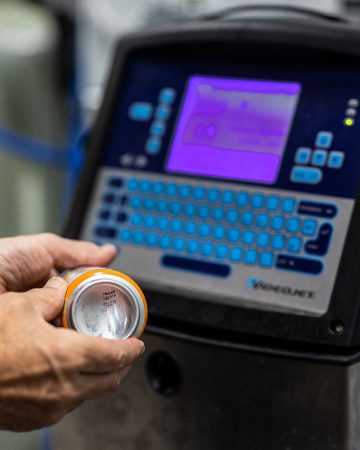
The Nine Lock plant employs a Videojet continuous inkjet (CIJ) small-character coder to apply the date of production and lot numbers to the bottom of each filled can of beer.
Stegmaier says these advance printing technologies allowed Spectrol to develop a unique textured finish on the cans’ backsides to replicate the feel of a wooden surface for consumers holding the can.
Shaped to resemble the blade of a kayak paddle, the touchy-feely graphic also contains the basic recipe and origins of the beer inside the can, printed in artisanal font to emphasize the product’s purity and authenticity.
“The surface granular varnish used in the process has a tactile feel so that a consumer would feel like their fingers are touching a wooden blade of a paddle,” says Stegmaier.
“This tactile surface effect provides consumer with an interactive experience and enhanced interaction with the product,” says Stegmaier, adding that Spectrol has by now shipped swell over a million such partly textured shrinksleeves to Nine Locks since the Aesus equipment installation.
“Our printing equipment gives us the ability to print on both sides of the web at the same time,” Stegmaier relates, “so as we apply ink on the inside of the film we also put the tactile finish on the outside of the film, albeit only in the registered area of the canoe blade graphic.”
Says Stegmaier: “We are proud to be a label supplier of choice supplier to a lot of other craft brewers, which is becoming a very important and fast-growing market for Spectrol.
“Our extensive knowledge of application technologies enables us to provide our customers with everything they want in the label.
“We are very pleased that Nine Locks was happy with the final outcome,” he concludes, “and we look forward to continuing our relationship with them as they grow their production volumes at their new facility.”
– PHOTOS BY BÉATRICE SCHULER
Advertisement

